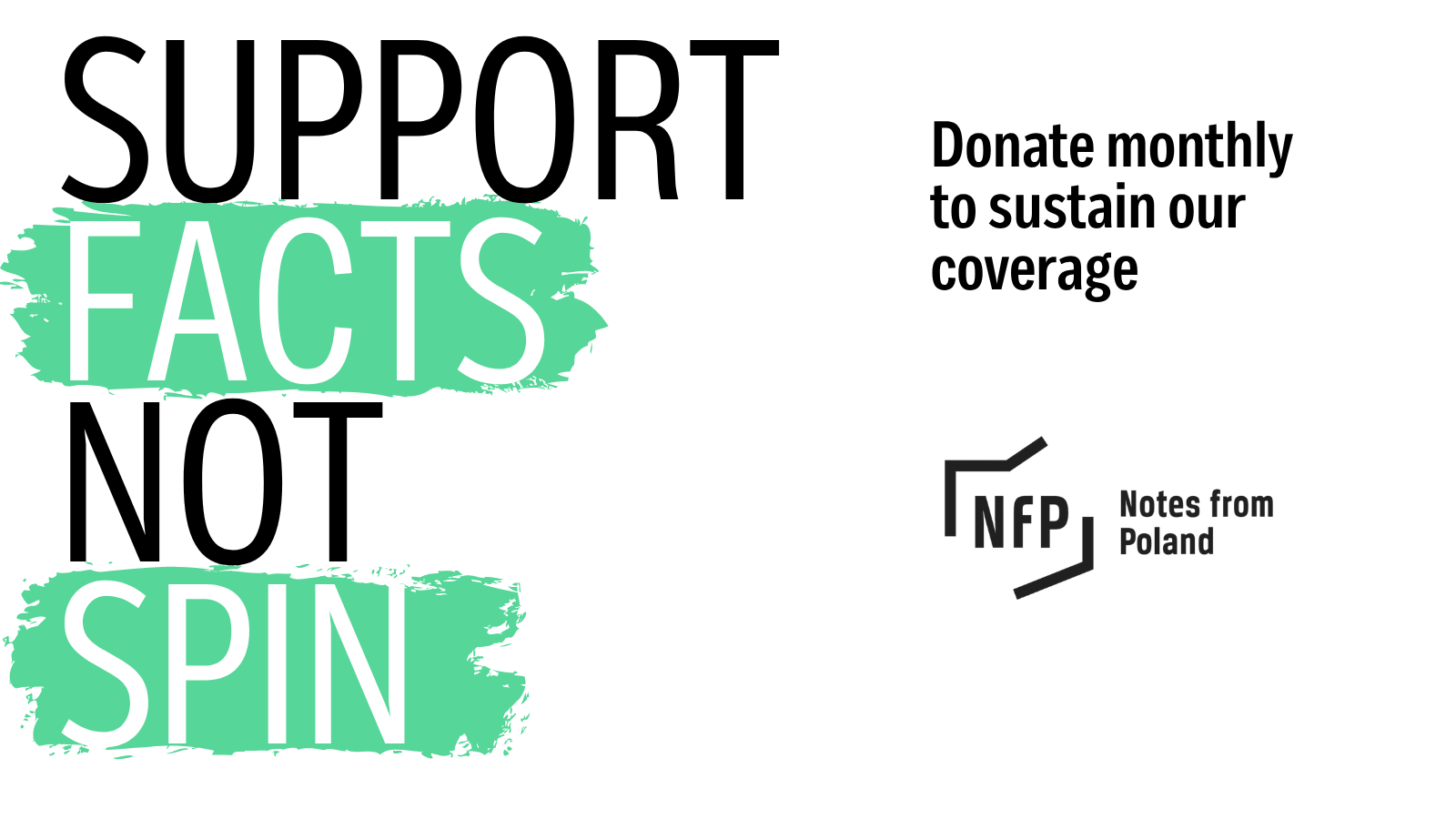Keep our news free from ads and paywalls by making a donation to support our work!

Notes from Poland is run by a small editorial team and is published by an independent, non-profit foundation that is funded through donations from our readers. We cannot do what we do without your support.
Poland’s culture ministry has presented a draft media bill that it says “will ensure the depoliticisation of public media”. However, the opposition has called the plans a “sham” that will simply “entrench” the government’s power over state broadcasters.
The proposed measures include introducing “apoliticality” standards for appointing public media authorities, dissolving the National Media Council (RMN) – a body created by the former Law and Justice (PiS) government to oversee public broadcasters – and replacing the television licence fee with direct state funding.
Under eight years of PiS rule, public media became a propaganda mouthpiece for the government. The current government, led by Prime Minister Donald Tusk, has pledged to restore neutrality. However, it has itself been accused of simply shifting the bias in its own favour.
Niezależność władz, stabilne finansowanie, ograniczenie wydawania prasy samorządowej – na tych trzech filarach oprze się znowelizowana ustawa medialna. 📺
Kwestię odpolitycznienia mediów publicznych i odbudowy społecznego zaufania do nich podkreślili w czasie dzisiejszej… pic.twitter.com/60LQWCybT9
— Ministerstwo Kultury i Dziedzictwa Narodowego (@kultura_gov_pl) October 30, 2025
When it came to power almost two years ago, one of the Tusk government’s first moves was to seize control of public broadcasters, a move condemned as illegal by PiS as well as some legal experts. Trust in public media has risen slightly since then, but more Poles still distrust it than trust it.
Under legislation outlined on Thursday by the culture minister, Marta Cienkowska, the RMN’s powers would be transferred to the National Broadcasting Council (KRRiT), which would be expanded from five to nine members serving six-year, rotating terms.
Members would be appointed by both chambers of parliament – the Sejm and the Senate – as well as by the president, with additional oversight from non-governmental organisations and public hearings.
The RMN, established by PiS in 2016, played a key role in shaping public media leadership during the party’s rule. The current government has questioned its legality, citing a 2016 Constitutional Tribunal ruling that found parts of the law establishing it unconstitutional.

Other provisions of the bill introduce new rules for appointing public media authorities through “transparent competitions based on competence criteria”.
Candidates would have to meet “apoliticality” standards – meaning they must not have been members of political parties within the past five years or held party functions or stood in elections within the past ten years.
The draft also calls for scrapping the television and radio licence fee, which Cienkowska described as “ineffective and outdated”. According to KRRiT data, only around 32% of households obliged to pay the fee actually do so.
Cienkowska instead proposes that public media would receive 2.5 billion zloty annually from the state budget, indexed to inflation.
Trust in Poland’s public media has risen for the second year running following the 2023 change in government.
However, the proportion of Poles who trust public media (35%) is still far outweighed by those who distrust it (48%) https://t.co/UBL3CRY4Ma
— Notes from Poland 🇵🇱 (@notesfrompoland) September 23, 2025
The legislation also seeks to limit the role of local government media to non-editorial bulletins without advertising. “The goal of these changes is to strengthen independent local media, which operate on market principles and form the foundation of a democratic society,” the ministry said in a statement.
Cienkowska added that her ministry is preparing a support programme for independent local outlets, to be announced next year.
“When we can implement changes, public media will be completely depoliticised, they will have new operating rules, new management boards, a new budget and stable financing,” Cienkowska said, quoted by the Polish Press Agency (PAP).
The draft will be reviewed by a government committee before public and inter-ministerial consultations. The culture ministry expects it to reach the Sejm, the lower house of parliament, early next year.
Even if the bill passes parliament, it would still require approval from PiS-aligned President Karol Nawrocki, who has the power to sign or veto bills, or refer them to the Constitutional Tribunal for review. He has regularly vetoed government bills.
Poland's public media “carried out systematic repressive actions against activists, NGOs and civil society” during the rule of the former PiS government, a report commissioned by the new government has found https://t.co/S2MO9KGssC
— Notes from Poland 🇵🇱 (@notesfrompoland) September 26, 2025
During PiS’s rule, TVP became a mouthpiece for the ruling party, with its news coverage praising the government and attacking the opposition. Surveys by state pollster CBOS, private firm SW Research, and the Reuters Institute at the University of Oxford consistently found low public trust in TVP during that period.
However, although Tusk’s government pledged to depoliticise the station, a report last year by the independent fact-checking organisation Demagog found that TVP’s coverage had now become biased towards the ruling coalition.
In response to Thursday’s announcement by the culture ministry, Joanna Lichocka, a PiS MP and member of the RMN, called the plans a “sham” that would simply “entrench [the government’s] power in the media”
Założenia ustawy wbrew temu, co deklarują jej twórcy oznaczają utrwalenie władzy koalicji 13 grudnia w mediach. Sejm i senat mają wybrać skład KRRiTV który będzie odwzorowaniem obecnej większości w parlamencie. Pozorem jest także deklarowanie, że tak wybrana KRITV będzie zdolna…
— Joanna Lichocka (@JoannaLichocka) October 30, 2025

Notes from Poland is run by a small editorial team and published by an independent, non-profit foundation that is funded through donations from our readers. We cannot do what we do without your support.
Main image credit: Caleb Oquendo/Pexels

Alicja Ptak is deputy editor-in-chief of Notes from Poland and a multimedia journalist. She has written for Clean Energy Wire and The Times, and she hosts her own podcast, The Warsaw Wire, on Poland’s economy and energy sector. She previously worked for Reuters.



















